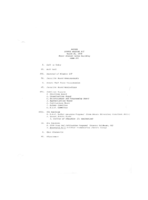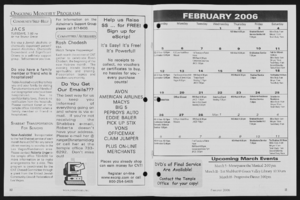Search the Special Collections and Archives Portal
Search Results
Johnny Eshow Haig Papers
Identifier
Abstract
The Johnny Eshow Haig Papers (1970-1990) are comprised of contracts, agreements, and correspondence of musician Johnny Haig, who worked as a trombone player and conductor at various hotels in Las Vegas, Nevada from 1955 until 2000. Additionally, the papers house extensive original music scores written by Haig. The papers primarily cover Haig’s later career in the 1970s and 1980s.
Archival Collection
Las Vegas Professional Men's Club Records
Identifier
Abstract
The Las Vegas Professional Men’s Club Records (1984-1997) consist of the constitution, meeting minutes, and organizational documents of the Las Vegas Professional Men’s Club, later known as the Las Vegas Men’s Club (LVMC). The LVMC provided a social outlet for gay men in Southern Nevada. The bulk of the materials date from the 1990s and include membership lists, event fliers, promotional materials, financial documents, and information documenting the club’s fundraising activities.
Archival Collection
Human Radiation Experiments Records
Identifier
Abstract
The Human Radiation Experiments Records (1949-1995) contain reports from the National Environmental Policy Act (NEPA), the Advisory Committee on Human Radiation Experiments (ACHRE), and the U. S. Department of Energy (DOE). Also included are newspaper clippings, a court case brought by the National Association of Radiation Survivors (NARS), and cancer research papers. With the goal of building an atomic bomb using plutonium extracted from uranium, the material also examines the outcomes of radiation exposure done on humans during the late 1940s and early 1950s at the Oak Ridge Nuclear Facility in Tennessee.
Archival Collection
Robert H. Crabtree papers, 1920 to 1999
Level of Description
Scope and Contents
The Robert H. Crabtree papers (1920-1999) sub-series contains an extensive account of Crabtree's career as a professor and archaeologist. Materials includes correspondence, photographic prints and negatives, reports, and notes of archeological surveys and excavations done in Southern California, Southern Nevada, Washington, Oregon, and Mexico. Collection includes resources such as field catalogs, proposals, newsletters, annual reports, workflow documentation, conference materials, and meeting minutes from various archaeological and anthropological societies and organizations. The subseries also includes class notes, dissertation drafts, and manuscripts used by Crabtree during his academic career. Digital files include field notes and reports.
Archival Collection
Collection Name: Elizabeth von Till and Claude N. Warren Professional Papers
Box/Folder: N/A
Archival Component

LaPalm Motel Neon Survey document, September 10, 2017
Date
Archival Collection
Description
Site address: 2512 Fremont St
Sign owner: La Palm Motel Inc
Sign details: Property originally constructed in 1963 on 0.33 acres.
Sign condition: 3 - the sign is in decent condition and appears worn from weather. It is unclear if the sign still lights up at night.
Sign form: Roadside pole sign
Sign-specific description: This pole roadside sign has a simple design. A large black pole supports the other elements for this sign. The top portion of the sign features a plastic, backlit sign reading "La Palm" in a black, serif text. Underneath the "lm" of the "La Palm" sign is a series of open channel letters spelling out "MOTEL" against a faded teal background. This portion of the sign is also a thin, rectangular shape allowing for an open space between the "MOTEL" of the sign and the pole that supports it. Underneath the "L" of the "MOTEL" is the bottom portion of the sign that is attached to the pole. This portion of the sign features a plastic, backlit sign reading "DAILY WEEKLY CABLE TV POOL KITCHENETTES LAUNDROMAT" in bold red letters against a white background. Under this is the word "VACANCY" painted in bold white text. Neon tubes spell out "NO" and outline "VACANCY." Along the outer edge of this sign facing Fremont, the sign is painted a pale yellow with incandescent light bulbs lining this section.
Sign - type of display: Neon, indandescent, backlit
Sign - media: Steel and plastic
Sign - non-neon treatments: Paint
Sign environment: This property sits at the corner of East Charleston and Fremont in an area filled with many other smaller motels. There is a Pepe's Taco and Lowe's Home Improvement that close to this motel.
Sign - date of installation: Possibly c. 1963
Sign - thematic influences: There is no exact theme replicated in this sign. It does look similar to other motel signs throughout the city since it sits directly along the roadside allowing motorist and pedestrians to see it easily.
Sign - artistic significance: This sign is a standard example of motel signage because it features the basic elements of a roadside motel sign. It has the name of the property, the word "motel", and other amenities that they may offer.
Survey - research locations: Assessor's website
Survey - research notes: http://www.roadsidepeek.com/roadusa/southwest/nevada/vegas/lvmotel/lvdownmotel/index4.htm
Survey - other remarks: There is not a date of any specific redesign of this sign; however, based on an earlier image of this sign the font in the "La Palm" portion of the sign did change somewhere along the way during the time this property has been around.
Surveyor: Lauren Vaccaro
Survey - date completed: 2017-09-10
Sign keywords: Neon; Incandescent; Backlit; Steel; Plastic; Paint; Pole sign; Roadside
Text

Transcript of interview with James M. Lancaster by Linda Voorvart, March 4, 1980
Date
Archival Collection
Description
On March 4, 1980, Linda Voorvart interviewed former senior safety engineer and power plant operator, James M. Lancaster (born July 5th, 1911 in Trinidad, Colorado) in his home in Las Vegas, Nevada. Lancaster explains how he first came to Southern Nevada from Mexico and Cuba. Lancaster then goes on to explain his occupational history, and the different jobs that he held in Southern Nevada, specifically at the Nevada Test Site.
Text

Contract, Instrument transferring interests in real and personal property, Las Vegas Land and Water Company, Audit No. 5351, June 1, 1954
Date
Archival Collection
Description
Release of all rights, licenses, leases, contracts, etc., of the Las Vegas Land and Water Company to the Las Vegas Valley Water District. Notarized by Louis Scholnick in Douglas County, Nebraska on June 3, 1954.
Text

Meeting minutes for Consolidated Student Senate, University of Nevada, Las Vegas, March 20, 1979
Date
Archival Collection
Description
Text

Transcript of interview with Brian Cram by Stefani Evans and Claytee White, October 28, 2016
Date
Archival Collection
Description
Throughout his career, former Clark County School District Superintendent (1989–2000) Brian Cram took his father's words to heart. He heard them repeatedly over the years as he watched and later, helped, his father clean classrooms at Robert E. Lake Elementary School: this place—the classroom—this is the most important place. Cram was born in Caliente, where his father worked on the railroad. In 1939, when Cram was a toddler, the family moved to Las Vegas and his father found work first as a sanitation engineer at a hospital, and then at CCSD as a custodian. The elder Cram, who spent his formative years in the Great Depression, prided himself on doing "good, honorable work" as a custodian, because the work—the classroom—mattered. Even so, he wanted more for his son. Cram largely ignored his father's advice during his four years at Las Vegas High School, where he ran with The Trimmers car club, wore a duck tail and a leather jacket, and copped an attitude. Cram's swagger, though, d
Text

